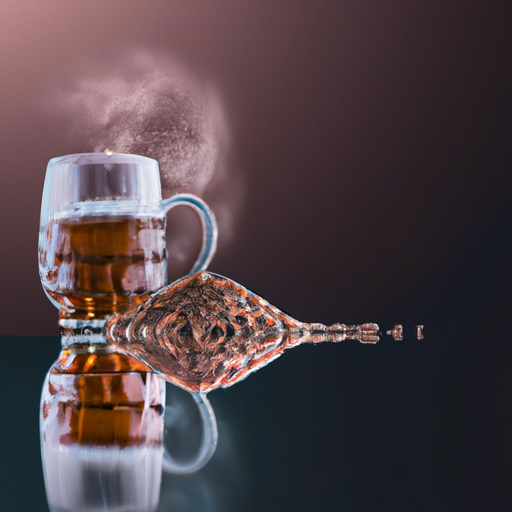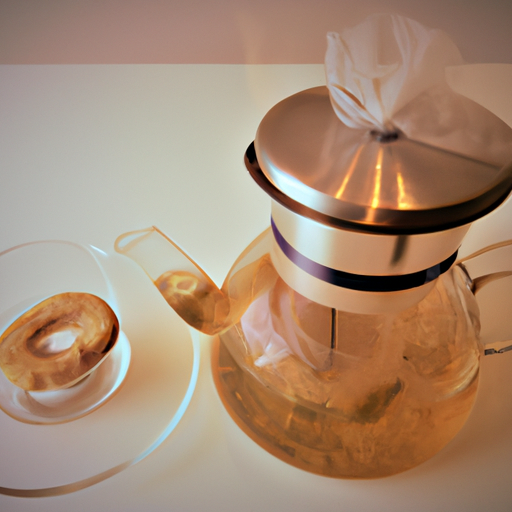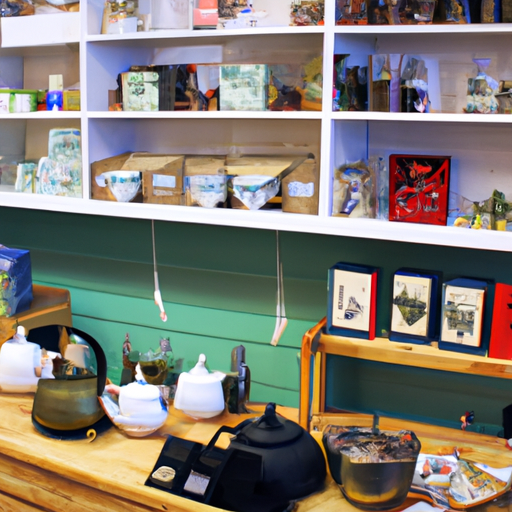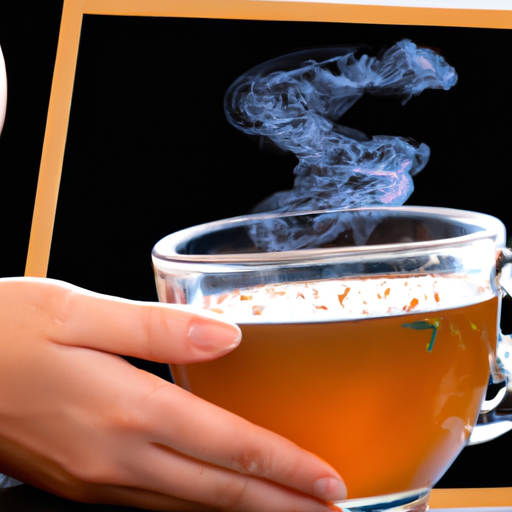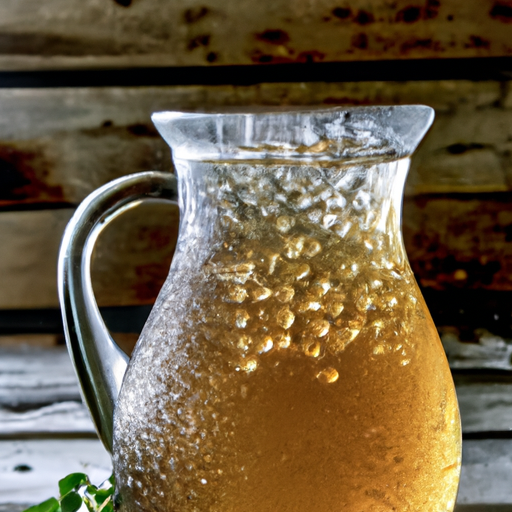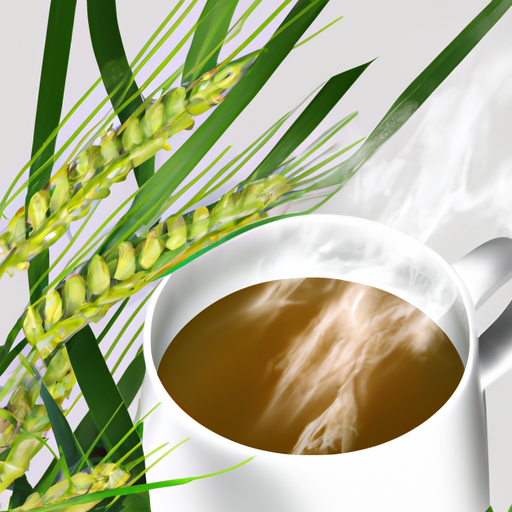I’ve always had a strong affinity for tea, and I relish experimenting with different blends and tastes. Not too long ago, I came across Mugicha, or Roasted Barley Tea, a beloved Japanese beverage crafted from roasted barley kernels.
At first, I was skeptical about how it would taste, but now it has become one of my favorite teas. Roasted Barley Tea has a unique nutty flavor with a touch of sweetness that makes it perfect for any time of the day. The aroma is also quite distinct, with subtle hints of roasted barley that can instantly transport you to a cozy café in Japan.
In this article, I will share my experience with Roasted Barley Tea and explore its taste profile, health benefits, brewing methods, cultural significance and much more!
Key Takeaways
- Roasted barley tea has a distinct nutty and sweet flavor that is comforting and invigorating.
- It is a caffeine-free alternative to traditional teas or coffee and is a powerhouse of antioxidants.
- Roasted barley tea is commonly consumed in Japan, Korea, and China, where it is served during celebrations and festivals and symbolizes prosperity, health, and unity among family and friends.
- Different brewing techniques, variations, and blends can enhance the flavor profile of roasted barley tea.
What is Roasted Barley Tea?
You’re in for a treat with roasted barley tea – it has a nutty and toasty flavor that’s perfect for any time of day. Roasted barley tea, also known as mugicha in Japan, is a popular drink made from roasted barley kernels. It has been enjoyed by people all over the world for centuries.
The history of roasted barley tea can be traced back to ancient China, where it was believed to have medicinal properties and was used to help with digestion and promote good health. Today, it’s still considered a healthy beverage due to its low caffeine content and high levels of antioxidants.
To make roasted barley tea, the kernels are first cleaned and then roasted until they turn brown. They are then steeped in boiling water for several minutes before being strained and served hot or cold. The production process is relatively simple, but the resulting drink is full of rich flavors that are both satisfying and refreshing.
Now let’s move on to taste and aroma – you’ll find that this unique beverage has a lot more to offer than just its interesting history and production process.
Taste and Aroma
I absolutely love the taste and aroma of roasted barley tea! It’s got a distinct nutty and sweet flavor that’s both comforting and invigorating.
The roasted aroma also adds to the overall experience, creating a warm and cozy atmosphere.
Nutty and Sweet Flavor
When you take a sip of roasted barley tea, the nutty and sweet flavor is so intense that it feels like you’re indulging in a decadent dessert. The nutty taste comes from the roasting process, which gives the barley a toasty aroma and enhances its natural sweetness. As for the sweetness, it’s not overpowering. Instead, it’s subtle and well-balanced with the nuttiness of the tea.
To fully appreciate the nuttiness and sweetness of roasted barley tea, I suggest drinking it on its own or pairing it with savory dishes like roasted meats or grilled vegetables. The contrast between the flavors will create an interesting interplay on your palate. When brewing this type of tea at home, use water that has just come to a boil and steep for around 5-10 minutes depending on your desired strength. And remember to use high-quality roasted barley for maximum flavor!
Moving on to our next subtopic about ‘roasted aroma’, when you inhale the steam rising from a freshly brewed cup of roasted barley tea, you’ll be hit by an intoxicating aroma that can only be described as warm and comforting.
Roasted Aroma
As the steam from a freshly brewed cup of roasted barley tea rises, its warm and comforting aroma fills the air. The scent profile of this tea is unique, with a distinct roasted aroma that comes from the roasting process of the barley grains.
It’s almost like smelling fresh coffee, but with a slightly nuttier and sweeter undertone. The roasting process involves heating up the barley grains until they turn golden brown. This not only enhances their flavor but also gives them an earthy, smoky fragrance that is quite appealing.
As someone who’s been drinking roasted barley tea for years, I can say that this aroma never gets old. It’s like being wrapped in a cozy blanket on a cold winter day – it just feels right. And best of all, it’s all-natural and healthy!
Health Benefits
Roasted barley tea is a powerhouse of antioxidants, elevating its status as a health elixir. The tea is rich in phenolic compounds, which are known to have strong antioxidant properties that help protect the body from harmful free radicals. This makes roasted barley tea an excellent choice for those looking to boost their immune system and improve overall health.
In addition to its antioxidant properties, roasted barley tea has several other benefits. It can help regulate blood sugar levels and lower cholesterol levels, making it beneficial for those with diabetes or high blood pressure. However, it’s important to note that too much of anything can be harmful, so precautions should be taken when consuming large amounts of this tea.
If you’re looking for a caffeine-free alternative to traditional teas or coffee, roasted barley tea is an excellent option. Not only does it offer a unique nutty flavor and aroma, but it also provides numerous health benefits without the negative effects of caffeine.
So why not give roasted barley tea a try and see what all the hype is about?
Caffeine-Free Alternative
Looking for a delicious and healthy caffeine-free alternative to your morning cup of joe? Try out roasted barley tea! This herbal tea is made from roasted barley grains, giving it a nutty flavor with hints of caramel. It’s the perfect choice for those who are looking for a warm and comforting drink that won’t give them the jitters.
Roasted barley tea is also known as mugicha in Japan, where it is traditionally served cold during the summer months. It’s a popular drink in Korean cuisine as well, often enjoyed with meals or as an after-dinner refreshment. Not only does this tea taste great, but it also offers numerous health benefits. It is believed to aid digestion, reduce inflammation, and even help regulate blood sugar levels.
If you’re looking for a caffeine-free alternative that’s both tasty and good for you, then roasted barley tea is definitely worth trying out. Check out the table below to learn more about its nutritional content:
| Nutrient | Amount per 100g |
|---|---|
| Calories | 354 |
| Fat | 2g |
| Carbs | 79g |
| Protein | 7g |
Now that you know all about the health benefits of roasted barley tea, it’s time to learn how to brew it properly. Stay tuned to find out more about brewing methods!
Brewing Methods
To prepare a delicious cup of barley tea, all you need is some roasted barley grains and hot water. For example, imagine waking up on a chilly morning and craving a warm beverage to start your day; instead of reaching for coffee, you decide to brew yourself a comforting cup of nutty, caramel-flavored roasted barley tea. To make it even more inviting, try adding a dash of honey or milk.
One great thing about brewing barley tea is that it can be prepared both hot and cold. Hot brewed roasted barley tea tends to have a stronger flavor profile than its cold counterpart. When making hot tea, I prefer using loose leaf grains rather than pre-packaged tea bags. The loose leaves allow for the full flavor to come through and create an overall better taste.
When it comes to cold brewed roasted barley tea, I tend to use pre-packaged tea bags as they’re more convenient for me when making large batches. The cold version has a milder taste but still retains the same nutty and caramel notes as the hot variety. It’s perfect for sipping on throughout the day or during warmer weather.
Pairing roasted barley tea with food can elevate any meal experience by complementing certain flavors or cleansing your palate between bites. But before we dive into that topic, let’s first explore different ways to enjoy this delightful beverage!
Pairing with Food
Enhance your meal experience with the perfect pairing of nutty, caramel-flavored roasted barley tea and your favorite dish.
Roasted barley tea is a versatile beverage that can complement a variety of foods. Its earthy taste and aroma make it an excellent choice for savory dishes like grilled meats, stews, and soups. It also pairs well with sweet desserts like chocolate cake or fruit tart.
Here are five food pairings that will take your roasted barley tea experience to the next level:
- Sushi: The nutty flavor of roasted barley tea complements the delicate flavors of sushi perfectly.
- Korean barbecue: The smokiness of grilled meats matches well with the boldness of roasted barley tea.
- Ramen: The richness of ramen broth is balanced by the refreshing taste of iced roasted barley tea.
- Dark chocolate: The bitterness in dark chocolate pairs well with the nuttiness in roasted barley tea.
- Fruit salad: A light and fresh fruit salad goes well with iced or hot brewed roasted barley tea.
Whether you’re using leaves or bags to brew your roasted barley tea, it’s important to follow proper brewing techniques to ensure maximum flavor extraction. Temperature, steeping time, and water-to-tea ratio all play a crucial role in achieving optimal results.
As we move on to discussing variations and blends in the next section, keep in mind how different brewing methods and food pairings can enhance your enjoyment of this delicious beverage.
Variations and Blends
Get ready to experience a whole new level of flavor with the exciting variations and blends of roasted barley tea. This beloved beverage isn’t just delicious on its own, but it also pairs well with many foods.
But did you know that you can enhance its taste even more by experimenting with different flavor combinations and brewing techniques? One popular variation is adding other ingredients to the tea, such as ginger or honey. Ginger adds a spicy kick while honey adds sweetness that complements the nutty flavor of the roasted barley.
Another way to mix things up is by blending roasted barley tea with other teas like green or black tea, creating unique flavors that still retain the distinct taste of roasted barley.
When it comes to brewing techniques, there are various ways to bring out different aspects of this drink’s flavor profile. For example, steeping at higher temperatures for longer periods results in a stronger brew with a more robust taste. On the other hand, lower temperatures produce a lighter and smoother tea that is perfect for enjoying during warmer weather.
As you explore these variations and blends, keep in mind that availability and accessibility may vary depending on where you live. However, don’t let this discourage you from trying out new things when it comes to your favorite beverage!
Availability and Accessibility
You may be wondering about where and how you can easily find roasted barley tea, as well as what factors affect its accessibility. The availability of this beverage varies depending on your location.
In areas where it is commonly consumed, such as Japan, Korea, and China, you can easily find roasted barley tea in supermarkets or convenience stores. However, in other countries or regions where it is less popular, it may be harder to find.
Local production also affects the accessibility of roasted barley tea. If you live in an area where the drink is produced locally, it will likely be more readily available than in areas where it needs to be imported. For example, if you live in Korea or Japan, local production means that roasted barley tea will be cheaper and easier to find. On the other hand, if you live in a country outside of Asia where there are no local producers of this beverage, getting your hands on some might require ordering online.
Online shopping has made it easier for people around the world to access products from different countries and cultures. This applies to roasted barley tea as well – even if there are no local producers near you, you can order the drink online from various retailers who specialize in Asian food and beverages. With just a click of a button, you could have a package of roasted barley tea shipped directly to your doorstep!
Now that we’ve talked about how accessible this drink is around the world, let’s dive into its cultural significance.
Cultural Significance
Well, ain’t it a hoot to learn about the cultural significance of that ol’ drink?
Roasted barley tea has been an essential part of Asian festivals and traditions for centuries. It is commonly served during celebrations like New Year’s Day, weddings, and even funerals. The tea symbolizes prosperity, health, and unity among family and friends.
In Japan, roasted barley tea or mugicha is often enjoyed during summer festivals or Obon season. It is believed that the cold beverage helps lower body temperature during hot weather.
In Korea, bori-cha is traditionally consumed before meals to aid digestion. Meanwhile, in China, the tea plays a crucial role in ancestral worship rituals as it represents one’s respect and gratitude towards their ancestors.
Roasted barley tea also holds great significance in traditional Korean culture. During Seollal (Lunar New Year) festivities, families gather together to share a warm cup of bori-cha while paying respects to their elders. The act of serving and drinking the tea symbolizes harmony and respect within the family unit.
Overall, roasted barley tea goes beyond being just another refreshing drink – it embodies cultural practices that have been passed down from generation to generation. Whether it be at special occasions or daily meals with loved ones, this humble drink serves as a reminder of our roots and values as a community.
Frequently Asked Questions
Is roasted barley tea safe for pregnant women to consume?
When it comes to pregnancy safety, roasted barley tea is generally considered safe for pregnant women to consume. In fact, some studies have suggested that drinking roasted barley tea during pregnancy may offer health benefits such as reducing the risk of gestational diabetes and high blood pressure.
However, it is important to consult with a healthcare provider before making any dietary changes during pregnancy.
Overall, while the taste and aroma of roasted barley tea may not be for everyone, its potential health benefits make it worth considering as part of a balanced diet during pregnancy.
Can roasted barley tea help with weight loss?
I’ve heard a lot about the potential benefits of roasted barley tea, especially when it comes to weight loss. Some people swear by it as an aid in shedding extra pounds. However, I wanted to do my own research to see if there are any risks associated with consuming this beverage for that purpose.
From what I’ve found, roasted barley tea is generally considered safe and may even have some positive effects on metabolism and digestion that could help with weight loss. Of course, like anything else, moderation is key. Drinking too much of this tea could lead to negative side effects.
Overall, though, it seems that roasted barley tea can be a helpful addition to a healthy diet and exercise routine for those looking to shed some extra pounds without causing harm.
How does the roasting process affect the nutritional value of the barley?
Roasting affects the nutritional value of barley in various ways. It alters the color, texture, and taste profile of the grain. The roasting process caramelizes the sugars present in barley, which gives it a nutty flavor and aroma. The longer the roasting time, the more intense its flavor.
However, this process also reduces some of its nutritional value, such as vitamins and minerals. Although roasted barley tea has a few health benefits, like aiding digestion and weight loss, it cannot be considered a replacement for a balanced diet or medical treatment.
In terms of taste profile, roasted barley tea is unique with its rich earthy notes that can be enjoyed hot or cold at any time of the day.
Is there a recommended amount of roasted barley tea to consume per day?
When it comes to roasted barley tea, the recommended daily intake will depend on a number of factors such as your age, overall health, and any pre-existing medical conditions. Generally speaking, however, you can safely consume up to 3-4 cups per day without worrying about adverse effects.
As for brewing methods, there are a variety of ways to make roasted barley tea depending on your taste preferences. Some people prefer to steep the tea in hot water for several minutes while others may prefer to grind the roasted barley into a fine powder and mix it with boiling water.
Regardless of how you choose to prepare your roasted barley tea, just be sure not to exceed the recommended daily intake and always consult with your doctor if you have any concerns about incorporating this beverage into your diet.
Can roasted barley tea be used as a natural remedy for any health conditions?
Oh, roasted barley tea. The elixir that can cure anything from a cold to a broken heart. Well, maybe not the latter, but it sure does have some health benefits.
Roasted barley tea is known for its ability to aid digestion and lower cholesterol levels. It’s also rich in antioxidants and has anti-inflammatory properties.
As for using it as a natural remedy for specific health conditions, there isn’t enough scientific evidence to support any claims just yet. However, incorporating roasted barley tea into your daily routine can definitely contribute to an overall healthier lifestyle.
To brew the perfect cup of roasted barley tea, use approximately 1 tablespoon of roasted barley per cup of water and steep for 5-10 minutes. Enjoy hot or cold!
Conclusion
In conclusion, I must say that roasted barley tea is a drink that truly surprised me. I wasn’t sure what to expect from this unique beverage, being someone who loves coffee and traditional teas. But after trying it for myself, I can confidently say that it’s a delicious and satisfying drink with a distinct flavor profile.
The nutty, earthy taste of roasted barley tea is unlike anything I’ve tried before. It’s both comforting and energizing at the same time, making it the perfect pick-me-up on a chilly day. Plus, with its numerous health benefits and caffeine-free properties, it’s no wonder why this tea has become so popular in recent years.
So if you’re looking for something new to try or simply want to switch up your daily routine, give roasted barley tea a chance – you won’t be disappointed! As my granny used to say, "If you want something done right, do it yourself!"And that’s exactly how I feel about making my own cups of roasted barley tea at home.
With its easy brewing methods and wide availability online or in specialty stores, there’s no reason not to give this wonderful beverage a shot. So grab some barley grains today and get ready to enjoy one of the most unique drinks out there!

